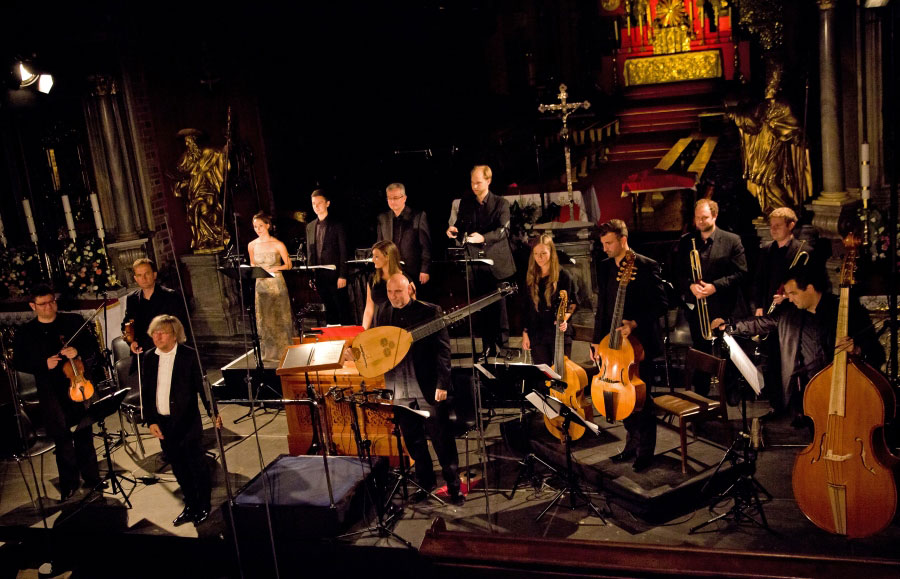The first sounds of the 1st Wratislavia Cantans were Baroque music. Thus the history of the festival began with Mikołaj Zieleński’s Magnificat. The last concert of the 1st edition which took place in 1966 presented Polish Baroque music by Bartłomiej Pękiel and Marcin Mielczewski. Nowadays, with hindsight we discern how much has changed in the perception and performance of early music.
Investigations into the mysteries of human creativity centuries ago ignited the imagination of young and enthusiastic musicians towards the end of the 1960s. Fledging in the 1970s, the historically-informed performance movement affected the lifestyles of its proponents as at that time it was a kind of music counter-culture. Thanks to studies of manuscripts and music treatises they have come closer to ways of playing and singing typical of bygone eras. Nowadays, buying a well-made copy of a historical instrument is no longer a problem, and there are many professional ensembles playing such instruments. In 1966 Wrocław musicians did not have a viola grande we will hear in Mielczewski’s Vespers. The massive line-up of Polish Radio and Television Choir engaged for Baroque works 50 years ago, nowadays would raise eyebrows – now the same works are performed by 8 singers only. And, last but not least, programming an a cappella mass with richly orchestrated Vespers for the same concert may seem peculiar. Yet the music itself has not changed, it is nowadays just as genius as it was in the 17th century and in 1966.
Bartłomiej Pękiel was the first Pole employed as master of the king’s music at the royal court in Wawel, Kraków. Before him, Italian composers held the post. Already his contemporaries knew they had to do with an outstanding personality: one of the artists, copying Pękiel’s Mass after Palestrina, added the word pulcherrima, i.e. the most beautiful, to the title. Pękiel’s mass is one of the fines examples of Polish Baroque a cappella polyphony.
The fortunes of Marcin Mielczewski’s output illustrate the difficulties which researchers into early music have been facing. Today we know 120 titles by Mielczewski, of which one-fourth have not survived, and another one-fourth are known only in fragments. The 60 works whose complete scores we know today have not survived in original manuscripts, but in two printed editions and handwritten copies, with noted differences between print and handwriting. The Magnificat ending Vesperae Dominicales in the manuscript from Kromierzyż has an instrumental line-up different from the copy found in Gdańsk. Some of the scores were lost during World War II, and only old photos testify to their existence. What is certain is that Mielczewski’s music inspired composers of Orthodox Church music, and some of his works were adapted for Lutheran liturgy too. Perhaps Bach himself stumbled upon Mielczewski’s compositions in the Lüneberg school library he visited.
Pękiel and Mielczewski represented the times when Polish music was on the highest artistic level. Centuries later we discover anew the wealth of our native Baroque culture, and the consecutive editions of Wratislavia Cantans have played an important role in bringing it back to our attention.

Wratislavia Cantans on tour
Wratislavia Pulcherrima in Bardo
14.09.2015
Mon.
7:00 PM
bazylika mniejsza Nawiedzenia NMP
Programme:
B.Pękiel – Missa Pulcherrima
M.Mielczewski – Vesperae Dominicales
Revival of a concert of the 1st Wrocław Oratorio-Cantata Festival, which took place on 18 August 1966.
Performers:
Andrzej Kosendiak – conductor
Aldona Bartnik, Agnieszka Ryman – soprano
Piotr Olech, Piotr Łykowski – countertenor
Maciej Gocman, Karol Kozłowski – tenor
Tomáš Král, Bogdan Makal– bass
William Lyons - bassoon
Wrocław Baroque Ensemble
